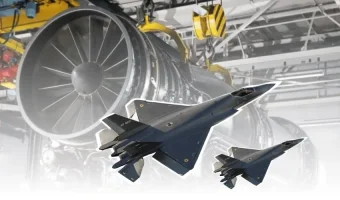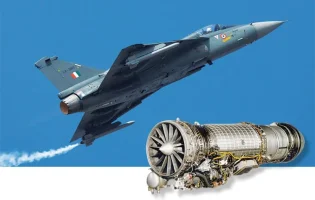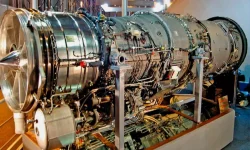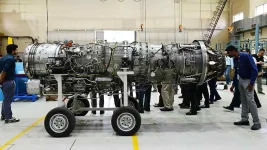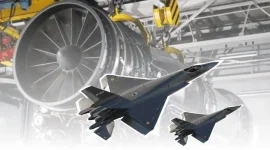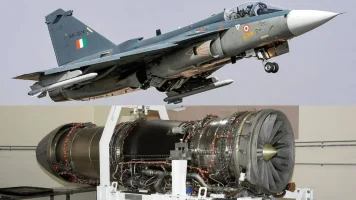- Views: 5K
- Replies: 25
India is taking a decisive step towards self-sufficiency in advanced military aviation technology, with the Gas Turbine Research Establishment (GTRE) clearly stating that the nation will require complete ownership of Intellectual Property Rights (IPR) and a full Transfer of Technology (ToT) for the engine that will power its futuristic Advanced Medium Combat Aircraft (AMCA).
This firm position is seen as crucial for India's long-term defence independence.
This strict condition highlights India's resolve to become self-reliant in the vital field of aero-engine development, an area where the country has previously faced challenges.
Supporting this national ambition, Dr. Samir V. Kamat, Chief of the Defence Research and Development Organisation (DRDO), has announced that GTRE is actively seeking a partner for the co-development of a sixth-generation jet engine for the AMCA.
Industry reports suggest that Rolls-Royce of the United Kingdom is currently leading the race, having offered a comprehensive deal that includes full IPR, a proposal that competitors Safran (France) and General Electric (GE) from the USA have reportedly found difficult to match.
The AMCA is a 5.5-generation stealth fighter aircraft, currently under development by the DRDO in collaboration with Hindustan Aeronautics Limited (HAL). Envisioned as a key component of India's air power modernisation, its induction into service is anticipated around 2035.
This advanced aircraft requires a powerful engine capable of producing 110 to 130 kilonewtons (kN) of thrust. This level of power is necessary to enable 'supercruise' (sustained supersonic flight without afterburners), maintain stealth characteristics, and support advanced systems such as sophisticated thermal management for potential future directed-energy weapons.
GTRE, which is leading India's engine development efforts, has made it clear that any international collaboration must fully align with India’s ‘Atmanirbhar Bharat’ (self-reliant India) initiative, which prioritises national control over critical technologies.
A senior GTRE official strongly reiterated that India will not compromise on its demand for 100% IPR and complete ToT. Securing full IPR means India will own the engine's design, its manufacturing processes, and the rights to all future upgrades. This will allow India to modify the engine for other platforms or even export it without needing permission from a foreign partner.
A complete Transfer of Technology will ensure that Indian scientists and engineers acquire not just the technical knowledge ('know-how') but also the underlying engineering principles ('know-why') to manufacture, maintain, and independently innovate on the engine technology in the future.
This stance is informed by lessons from past collaborations, such as the Kaveri engine program, where limitations in technology sharing with partners like France’s Snecma (now part of Safran) were perceived to have impeded indigenous progress.
Three major global aerospace companies are in contention to partner with India for the AMCA engine: Rolls-Royce (UK), Safran (France), and General Electric (GE Aviation, USA). However, their proposals vary significantly in how they meet India's non-negotiable terms.
Rolls-Royce has emerged as the strongest contender by offering to co-develop a new 110kN thrust class engine specifically designed for the AMCA, with a commitment to transfer 100% of the Intellectual Property Rights to India. Their offer also includes full technology transfer and support for establishing engine manufacturing facilities within India, which perfectly matches India’s goals for self-reliance.
Rolls-Royce's involvement in developing advanced technologies for sixth-generation engines, such as through the UK-led Tempest program, further strengthens its proposal, as the AMCA engine is expected to incorporate cutting-edge features like variable cycle technology for improved fuel efficiency and thrust across different flight regimes.
Safran, which has a history of collaboration with India, including supplying engines for the Rafale fighter jets, has offered full technology transfer for a new engine in the 110-130kN class. However, the French company has proposed retaining 50% of the IPR, which would likely result in long-term royalty payments to Safran.
GTRE officials have firmly rejected this condition, stating that any agreement is contingent on Safran offering 100% IPR along with the complete ToT. While Safran’s technical proposal, drawing on its experience with engines like the M88, is considered sound, the partial IPR ownership does not meet India’s strategic objective of complete technological autonomy.
General Electric, a long-standing supplier to India providing F404 engines for the Tejas Light Combat Aircraft and F414 engines for the initial batches of the AMCA (Mk-1), has been the least accommodating. The US firm has reportedly offered around 90% ToT but has insisted on retaining full IPR for the engine.
This position is unacceptable to GTRE, given India’s emphasis on complete technological control. GE's stance is likely influenced by stringent US export control regulations, particularly the International Traffic in Arms Regulations (ITAR), which often restrict the sharing of sensitive defence technologies. This has effectively placed GE at a disadvantage in the competition, as India prioritises long-term strategic independence over immediate technological access.
Dr. Kamat's confirmation that GTRE is aiming for a sixth-generation jet engine for the AMCA program signifies a forward-looking approach. The initial version, AMCA Mk-1, will be powered by the GE F414 engine, producing 98kN of thrust. However, the more advanced AMCA Mk-2 variant, expected by 2040, will require a significantly more powerful and technologically advanced engine to match contemporary global fighter aircraft, such as China’s J-20 and other emerging sixth-generation fighters.
A sixth-generation engine, potentially incorporating features like adaptive cycle technology, could offer substantial performance improvements, such as up to 30% greater range and 20% faster acceleration compared to current fifth-generation engines. It would also be designed to support advanced capabilities like the integration of AI-driven drone swarms and the power requirements for laser-based defence systems.
Rolls-Royce’s offer of full Intellectual Property Rights uniquely aligns with India's long-term strategic vision. By owning the engine technology outright, India would not only equip the AMCA but could also adapt the core technology for other indigenous military aviation projects, such as the Twin Engine Deck-Based Fighter (TEDBF) for the Indian Navy or a future true sixth-generation fighter aircraft.
Furthermore, the establishment of local production facilities, as proposed by Rolls-Royce, has the potential to transform India into a significant player in the global aero-engine manufacturing landscape, possibly opening up future export opportunities.
Conversely, Safran’s proposal to retain 50% IPR is seen as undermining India’s objective of true self-reliance, as it would likely entail ongoing financial obligations through royalties and restrictions on independent modifications.
GE’s offer, while technologically credible, is hampered by geopolitical and regulatory constraints that make it the least attractive option for India's strategic requirements.
The focus remains firmly on securing a partnership that guarantees India's sovereignty over critical defence technology for decades to come.

